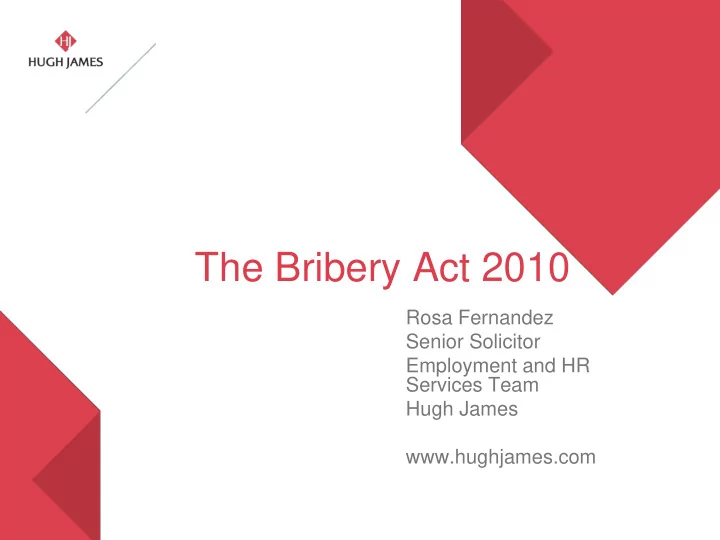

The Bribery Act 2010 Rosa Fernandez Senior Solicitor Employment and HR Services Team Hugh James www.hughjames.com
Why did we need a Bribery Act? Existing law inconsistent with the OECD (Organisation for Economic Co-operation and Development) Bribery Convention, which UK ratified in 1998 OECD heavily criticised the judicial handling of the investigation into bribery allegations against BAE systems
Commencement The Bribery Act (“BA”) received Royal Assent on 8 April 2010 On 20 July 2010, the government announced the BA would come into force in April 2011 On 31 January 2011 the Justice Minister announced that the BA would not come into force until 3 months after the Guidance is published Watch this space!
What is Bribery? Defined in the BA 2010 as a “financial or other advantage” offered, promised or given to induce a person to perform a relevant function of activity improperly, or to reward them for doing so (section 1)
Offences under the Bribery Act The BA introduces 4 new criminal offences: Bribing another (section 1) Being bribed (section 2) Bribing a foreign public official (section 4) Failure of a commercial organisation to prevent bribery by an “associated person” for its benefit (section 7)
The Key Concepts Advantage – financial or otherwise Improper performance Relevant function or activity Associated person Adequate procedures
s.1 Bribing another person Offering, promising or giving an advantage to someone either: Where you intend to bring about an improper performance of a relevant function or activity, or to reward improper performance (s.1(2)) Where you know or believe that the acceptance of the advantage offered, promised or given, in itself constitutes the improper performance of a relevant function or activity (s.1(3))
Relevant function or activity Includes: Functions of a public nature Activities connected with a business Activity performed in the course of a person’s employment Activity performed by or on behalf of a body of persons
Who is an “associated person”? “Associated person” is (widely) defined in section 8 of the BA Assumption that all employees will be associated persons Covers those who perform services for, or on behalf of, the employer e.g. agents, subsidiaries, consultants, agency workers, volunteers, etc.
Penalties Consequences of a breach of the BA are severe Individuals face up to 10 years’ imprisonment Commercial organisations can be fined an unlimited amount and prevented from tending for public contracts
Authority to Prosecute? The Director of Public Prosecutions The Director of the Serious Fraud Office The Director of Revenue and Customs Prosecutions
The “adequate procedures” defence Under section 7(2) an employer has a defence if it can show that it had in place “adequate procedures” designed to prevent bribery. No definition of what constitutes “adequate procedures”.
Draft guidance The draft guidance sets out 6 key principles intended to give commercial organisations a starting point for planning, implementing, monitoring & reviewing their anti-corruption and bribery procedures The final version of the guidance was expected to be published in January 2011 – but still waiting!
The 6 Key Principles Principle 1: Risk Assessment Principle 2: Top Level Commitment Principle 3: Due Diligence Principle 4: Clear, practical and accessible policies and procedures Principle 5: Effective Implementation Principle 6: Monitoring and Review
Key Issues for Employers Recruitment Background checks & vetting Careful documentation Training
Key Issues for Employers Expenses Audit expenses processes regularly Evidence how and why money has been spent for each expense claim submitted
Key Issues for Employers Gifts and Hospitality Policy with clear guidance on both the giving and receiving of gifts Procedures on making political or charitable donations and sponsorships
Key Issues for Employers Disciplinary Procedures Amend disciplinary rules and policies to make it clear that breach of anti-corruption and bribery policy and related procedures may amount to gross misconduct
Key Issues for Employers Contractual requirements Specific contractual requirement to comply with procedures if: Carrying on business in high-risk sectors Senior or external-facing workers over which employer has minimal control
Key Issues for Employers Bonus & Commission Schemes Ensure they do not unintentionally encourage employees to ignore bribery and corruption risks Credit not to be given where bribery suspected
Key Issues for Employers Whistle-blowing Policies Comprehensive and up to date policy Made available to all workers to whom the anti- corruption and bribery policy applies
Key Issues for Employers Investigating a concern Employers must investigate and document every incident of a suspected breach Consider who should carry out the investigation Consider whether suspension is appropriate Steps needed to ensure confidentiality Obligation to report concerns to external regulators or governing bodies
Key Issues for Employers Discrimination issues Ensure policies and procedures are not developed based on racial stereotyping of certain nationalities Risk assessments of the risks of bribery in the relevant regions – The Transparency International Corruption Perceptions Index
Grey Areas Corporate hospitality Foreign offset arrangements Facilitation payments
Other Guidance Transparency International “Business Principles for Countering Bribery” http://www.transparency.org/content/download/43008/687420/
Questions? Rosa Fernandez Senior Solicitor Employment and HR Services Team Hugh James www.hughjames.com
Recommend
More recommend